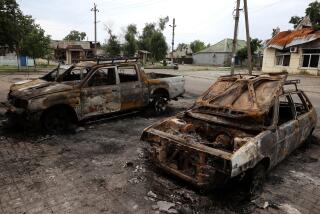COLUMN LEFT : Bombs, the Moral Tools of the West : Britain’s chemical attacks on Iraq in the 1920s presaged today’s U.S. bombardment.
The concept of bombing Iraq as an essentially wholesome liaison between morality and Western technological prowess goes back to 1919, when Britain sought dominance of the Gulf oil fields and a docile government in Baghdad as an outcome of World War I. The Royal Air Force asked Winston Churchill, then the secretary of state for war, for permission to use chemical weapons, the “smart bombs” of their day, “against recalcitrant Arabs as an experiment.” Churchill rejected timid nay-sayers. “I do not understand squeamishness about the use of gas,” he wrote. “I am strongly in favor of using poisoned gas against uncivilized tribes. . . . It is not necessary to use only the most deadly gases; gases can be used which would cause great inconvenience and would spread a lively terror and yet would leave no serious permanent effects on most of those affected.”
Chemical weapons, Churchill concluded, represent “the application of Western science to modern warfare. . . . We cannot in any circumstance acquiesce in the non-utilization of any weapons which are available to procure a speedy termination to the disorder which prevails on the frontier.”
From Churchill’s view that gas bombs might, if judiciously applied, be merely “inconvenient” to their targets, it is but a short leap to today’s hearty applause for the moral properties of Tomahawk and laser-guided bomb as they descend upon Iraq, said applause no doubt being overture to tomorrow’s calls for understanding if it becomes necessary to use nuclear weapons to overwhelm Iraqi intransigence.
By 1920 the British army was using gas shells in Iraq with “excellent moral effect,” a phrase often used by British officers to describe the result of their bombing on Third World peoples. Ordinary shells were used when villages did not pay their taxes. The Royal Air Force, balked by technical glitches from using the mustard-gas bombs urged by Churchill, dropped explosives with delayed-action fuses to stop peasants cultivating their fields after dark. In the military briefing room in Riyadh today this would doubtless be termed “interdiction of Iraq’s military infrastructure”.
The context of the British bombing of the 1920s was crude enough. Churchill, desperate to revive his own unstable political fortunes, was eager to secure British domination of the Iraqi oil fields. The nascent Royal Air Force was anxious to prove its worth and thus secure a larger slice of the arms budget from the army and navy. The British government, fearful of impending economic recession at home, wanted colonial control on the cheap, with a puppet king installed in Baghdad, other Arab leaders pacified with bribes and control exercised through indirect rule.
When Saddam Hussein invaded Kuwait, many of the children and grandchildren of those on the receiving end of British bombs did not support his deed. My brother Patrick, in Baghdad reporting for the British Independent newspaper when the bombing started Jan. 16, noted that “On Wednesday, many Iraqis would openly say that going into Kuwait was Saddam’s business, not theirs. By the weekend it was almost impossible to meet anybody who did not feel that Iraq would, and should fight.” As always, bombing firms up civilian morale, while falling far short of its proclaimed military objectives.
When President Bush first sent troops to the Gulf back in August, he proclaimed that they had been dispatched purely to defend Saudi Arabia. When he launched Operation Desert Storm on Jan. 16, he publicly stated that the sole object of the exercise was the liberation of Kuwait. A week later, government officials in both Washington and London were stating clearly enough that the object of the exercise was the destruction of Saddam Hussein and the return of Iraq to the vassal status desired by the British 70 years ago.
In moral texture there is little to separate the U.S. President from his Iraqi opposite number. The difference lies in superior resources of violence. From the situation last August, where Saddam Hussein was truly isolated both at home and abroad, President Bush has now firmed Hussein’s standing at home and united the peoples of North Africa, the Arab world, the Indian subcontinent, Malaysia and Indonesia in admiration of Hussein and execration of the United States. He has simultaneously debased--probably forever--any claims that the United Nations might ever have had to be a supranational body rather than the creature of U.S. policy, a policy which to many, especially in in the Third World, resembles exactly the plans of Churchill for Iraq in the waning moments of British imperialism.
More to Read
Sign up for Essential California
The most important California stories and recommendations in your inbox every morning.
You may occasionally receive promotional content from the Los Angeles Times.










